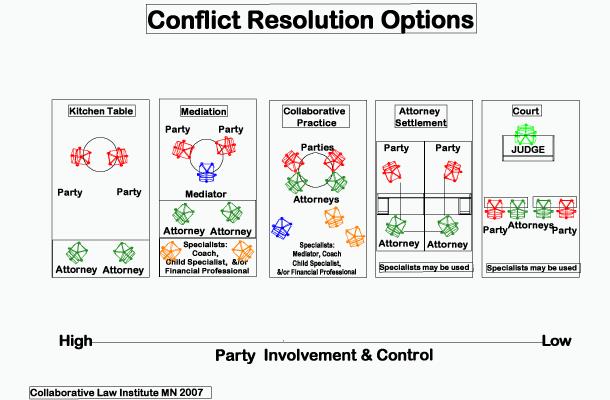What is a property settlement or divorce without court?
Before we talk about how to divorce without court, we need to explain is that what most people descibre as 'Divorce' is actually three separate things:
Divorce - which is the legal end of your marriage
Property Settlement - which is the division of your assets and liabilities
and
A divorce can be obtained by filing documents with the Family Court after you have been separated for one year.
A property settlement or parenting arrangements can be finalised as soon as you and your former spouse/partner reach agreement.
Our Family Law Answers FAQ section explains this in more detail.
For the sake of simplicity, we will use the term Divorce to refer to both property settlement and parenting matters, as people consider them one and the same.
What we are really talking about though, is you resolving your family property settlement and/or parenting matters by consent
without a judge making the decision for you.
Why Divorce without Court?
It is (fortunately) very rare for a client to walk into our Brisbane office saying
"I'm getting a Divorce and I want to go to Court!"
Most people realise that Family Court system has significant delays. Waiting 2- 3 years for a hearing is not unusual.
Family Law system delays come with a cost.
Yes, there is the cost of legal fees.
But there are also hidden costs...
Time off work to attend court hearings.
Late nights and weekends spent working on court documents
Being constantly involved in conflict.
Experiencing high levels of stress and conflict for a 2 to 3 year period is not what most people most look forward to after they separate.
Most cases that go to trial are where there are serious safety issues for children. 47% of all cases filed in court each year are referred to child protection authorities.
If that is not your family dynamics, why would you put the future of your children in the hands of a stranger?
About 95% of Family Court cases settle before a judge has to make a decision.
So why not divorce without court at the beginning, rather than spending 2 to 3 years of your life in the Family Court only to settle in the end anyway?
Options to reach a family law agreement without Court
There are several ways you can reach a consensual family agreement and divorce without court.
The main ones are:
Negotiation
Mediation
Collaborative Law (also called Collaborative Divorce)

Negotiation
Many couples come to us having negotiated their family law agreement between themselves 'around the kitchen table'.
However, often we are asked to make an agreement into court orders so that there is certainty.
If you are dividing property, it is critical to have formally binding Family Court Orders or a Binding Financial Agreement.
Writing it out yourselves is not legally binding and can cause lots of unnecessaray dramas - including paying stamp duty when you don't need to!
If you come to us to formalise your agreement, we are required to give you legal advice.
This also gives you peace of mind that the agreement will be acceptable to the Family Court - they won't just rubber stamp it if it isn't 'just and equitable'.
We prepare family law consent orders for a fixed fee.
Mediation
Mediation is a popular way to divorce without court.
In Mediation you work with a neutral family law mediator who assists you to reach agreement.
We have represented countless clients at mediation and find that it is very effective to resolve matters even if they are already in the Family Court System.
Jennifer Hetherington
is Nationally Accredited Mediator and Registered Family Dispute Resolution Practitioner.
She can mediate for you, with or without your lawyers, and issue a section 60I Certificate if needed.
Contact us to discuss us representing you at mediation or having Jennifer as your mediator.
Jennifer is also available as a family law mediator through Untying the Knot, a fixed fee family law mediation service.
Collaborative Divorce
Collaborative Divorce, also called Collaborative Law or Collaborative Practice, Is the ultimate 'divorce without court'.
It is a consensual resolution process where both parties commit reaching a family law agreement and to divorce without court.
It offers opportunities to explore the goals and needs of everyone in the family, to conclude an agreement that will be accepted by everyone and be long-lasting
Arbitration
If you are already in the Family Court and just can't see eye to eye, all is not lost!
You can skip that 3 year wait and use Arbitration to finalise your family law settlement.
It's a bit like using a private hospital for a knee replacement instead of being on the public waiting list.
No, you don't reach your own agreement,
but if you are unable to agree, it is certainly a much faster process and is an option to divorce without court delays.
Choose the best family lawyer to help you divorce without court
If you want to divorce without court, you need to choose your family lawyer wisely.
Do you want a Gladiator?
Or do you need a trained, skilled negotiator and collaborator who is focused on helping you reach agreement?
Our specialist Brisbane family lawyers are focused on reaching agreement and helping you divorce without Court.

